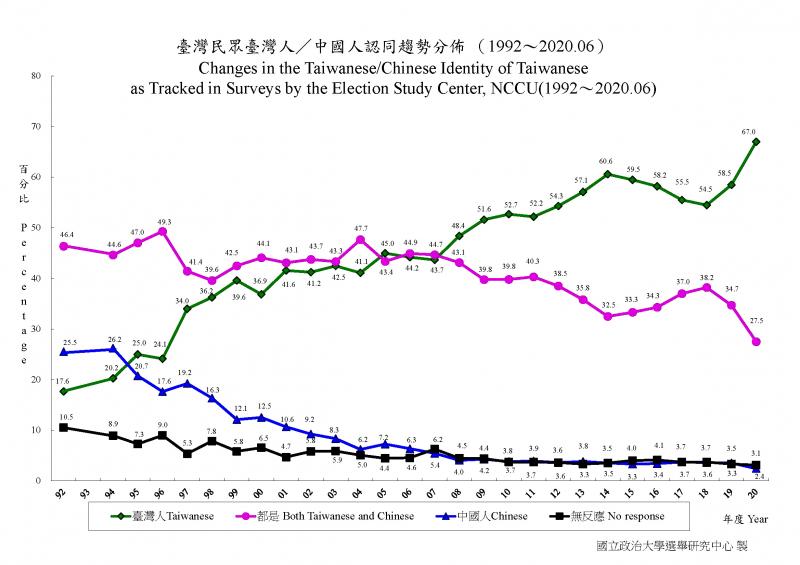A record number of people in the nation now regard themselves as “Taiwanese,” rather than “Chinese,” a survey released on Friday by National Chengchi University’s Election Study Center showed.
A record 67 percent of the population identify as “Taiwanese,” while only 2.4 percent consider themselves to be “Chinese,” the center said, citing the survey’s findings.
The center has been conducting the survey once or twice a year since June 1992, and uses the data to study trends in the self-identity of Taiwanese, it said.

The most recent results represented an 8.5 percentage point increase in those identifying as “Taiwanese,” up from 58.5 percent, and a 3.3 percentage point decrease in those identifying as “Chinese,” down from 5.7 percent, in June last year.
The results showed that 27.5 percent of respondents consider themselves to be both “Taiwanese” and “Chinese,” down from 34.7 percent last year.
Those surveyed who would advocate Taiwanese independence — if pressed to choose that or unification — also increased, rising from 15.1 percent in 2018 to 27.7 percent this year, the center said, adding that a separate 7.4 percent hoped for independence “as soon as possible.”
Those wanting to “maintain the ‘status quo’ for now” accounted for 28.7 percent, while those hoping that the “status quo” could be maintained in perpetuity accounted for 23.6 percent.
Those wanting to “unify with China as soon as possible” accounted for 0.7 percent.
Asked which political party they supported, 36.8 percent said the Democratic Progressive Party — the highest since the center began the surveys — while 15.8 percent said the Chinese Nationalist Party (KMT) — the lowest since the start of the center’s surveys.
While 5.3 percent expressed support for the Taiwan People’s Party and 3.3 percent for the New Power Party, at 37.8 percent expressed a politically neutral stance and favored no particular party.
Asked about the survey yesterday, Premier Su Tseng-chang (蘇貞昌) said that an increase in Taiwanese national consciousness was “a matter of course,” and that “with an enemy at the nation’s doors, the people were bound to unite.”
All Taiwanese share the same fate and are “one people under one nation” that would face threats together, he said.
Su gave the example of the COVID-19 pandemic, saying that everyone in Taiwan kept pace, and supported containment and prevention measures.
“Only by coming together can we stay strong and make progress,” Su added.
Additional reporting by Tsai Chang-sheng

ACTION PLAN: Taiwan would expand procurement from the US and encourage more companies to invest in the US to deepen bilateral cooperation, Lai said The government would not impose reciprocal tariffs in retaliation against US levies, President William Lai (賴清德) said yesterday, as he announced five strategies to address the issue, including pledging to increase Taiwanese companies’ investments in the US. Lai has in the past few days met with administrative and national security officials, as well as representatives from various industries, to explore countermeasures after US President Donald Trump on Wednesday last week announced a 32 percent duty on Taiwanese imports. In a video released yesterday evening, Lai said that Taiwan would not retaliate against the US with higher tariffs and Taiwanese companies’ commitments to

Intelligence agents have recorded 510,000 instances of “controversial information” being spread online by the Chinese Communist Party (CCP) so far this year, the National Security Bureau (NSB) said in a report yesterday, as it warned of artificial intelligence (AI) being employed to generate destabilizing misinformation. The bureau submitted a written report to the Legislative Yuan in preparation for National Security Bureau Director-General Tsai Ming-yen’s (蔡明彥) appearance before the Foreign Affairs and National Defense Committee today. The CCP has been using cognitive warfare to divide Taiwanese society by commenting on controversial issues such as Taiwan Semiconductor Manufacturing Co’s (TSMC, 台積電) investments in the

HELPING HAND: The steering committee of the National Stabilization Fund is expected to hold a meeting to discuss how and when to utilize the fund to help buffer the sell-off The TAIEX plunged 2,065.87 points, or 9.7 percent, to close at 19,232.35 yesterday, the highest single-day percentage loss on record, as investors braced for US President Donald Trump’s tariffs after an extended holiday weekend. Amid the pessimistic atmosphere, 945 listed companies led by large-cap stocks — including Taiwan Semiconductor Manufacturing Co (TSMC, 台積電), Hon Hai Precision Industry Co (鴻海精密) and Largan Precision Co (大立光) — fell by the daily maximum of 10 percent at the close, Taiwan Stock Exchange data showed. The number of listed companies ending limit-down set a new record, the exchange said. The TAIEX plunged by daily maxiumu in just

‘COMPREHENSIVE PLAN’: Lin Chia-lung said that the government was ready to talk about a variety of issues, including investment in and purchases from the US The National Stabilization Fund (NSF) yesterday announced that it would step in to staunch stock market losses for the ninth time in the nation’s history. An NSF board meeting, originally scheduled for Monday next week, was moved to yesterday after stocks plummeted in the wake of US President Donald Trump’s announcement of 32 percent tariffs on Taiwan on Wednesday last week. Board members voted to support the stock market with the NT$500 billion (US$15.15 billion) fund, with injections of funds to begin as soon as today. The NSF in 2000 injected NT$120 billion to stabilize stocks, the most ever. The lowest amount it